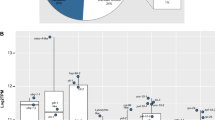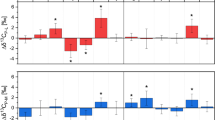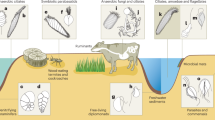Abstract
THE conflicting evidence concerning the relative importance of aerobic mechanisms in the metabolism of nematode parasites of the alimentary tract may be summarized by reference to the work of Davey1, who found that oxygen prolonged the survival of certain intestinal parasites in vitro, and that of von Brand and Weise2, who found oxygen to be absent, or present only in small amounts, in the contents of the alimentary tracts of several host animals.
This is a preview of subscription content, access via your institution
Access options
Subscribe to this journal
Receive 51 print issues and online access
$199.00 per year
only $3.90 per issue
Buy this article
- Purchase on Springer Link
- Instant access to full article PDF
Prices may be subject to local taxes which are calculated during checkout
Similar content being viewed by others
References
Davey, D. G., J. Exp. Biol., 15, 217 (1938).
v. Brand, Th., and Weise, W., Z. vergl. Physiol., 18, 339 (1932).
Brink, F., and Davies, P. W., Rev. Sci. Instr., 13, 524 (1942).
Porter, D. A., J. Parasit., 21, 226 (1935).
Author information
Authors and Affiliations
Rights and permissions
About this article
Cite this article
ROGERS, W. Aerobic Metabolism in Nematode Parasites of the Alimentary Tract. Nature 163, 879–880 (1949). https://doi.org/10.1038/163879a0
Issue Date:
DOI: https://doi.org/10.1038/163879a0
This article is cited by
-
The Tricarboxylic Acid Cycle in Nematode Parasites
Nature (1949)
Comments
By submitting a comment you agree to abide by our Terms and Community Guidelines. If you find something abusive or that does not comply with our terms or guidelines please flag it as inappropriate.



